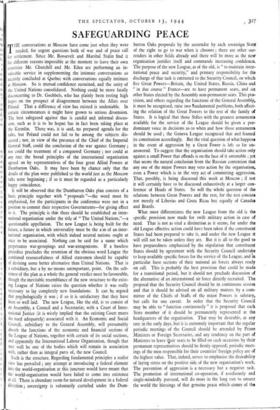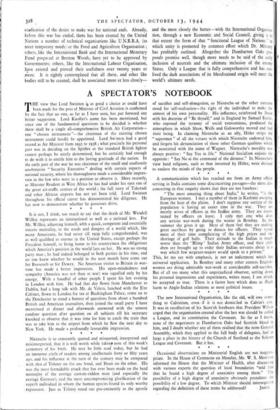SAFEGUARDING PEACE
THE conversations at Moscow have come just when they were needed, for urgent questions both of war and of peace call for settlement. Since Mr. Roosevelt and Marshal Stalin find it for different reasons impossible at the moment to leave their own countries Mr. Churchill and Mr. Eden are performing an in- valuable service in supplementing the intimate conversations so recently concluded at Quebec with conversations equally intimate at Moscow. So is mutual, confidence sustained, and the unity' of the United Nations consolidated. Nothing could be more fatally disconcerting to Dr. Goebbels, who has plainly been resting high hopes on the prospect of disagreement between the Allies over Poland. That a difference of view has existed is undeniable. In certain circumstances it might have grown to serious dissension. The best safeguard against that is candid and informal discus- sion, such as it is to be hopee has in fact been taking place at the Kremlin. There was, it is said, no prepared agenda for the talks, but Poland could not fail to be among the subjects dis- cussed ; nor, in view of the presence of the Chief of the Imperial General Staff, could the conclusion of the war against Germany ; nor could the treatment of a conquered Germany ; nor could at any rate the broad principles of the international organisation agreed on by representatives of the four great Allied Powers at Dumbarton Oaks. It may have been by chance only that the details of the plan were published to the world just as the Moscow talks were beginning ; if so it must be regarded as a particularly happy coincidence.
It will be observed that the Dumbarton Oaks plan consists of a basic principle together with " proposals "—the word must lie emphasised, for the participants in the conference were not in a position to commit their respective Governments—for giving effect to it. The principle is thAt there should be established an inter- national organisation under the title of " The United Nations,"—a questionable appellation. The new League is being built for the future, a future in which universality must be the a:m of an inter- national organisation, with which indeed neutral nations ought at once to be associated. Nothing can be said for a name which perpetuates war-groUpings and war-antagonisms. If a baseless prejudice precludes the retention of the obvious word League the combined resourcefulness of Allied statesmen should be capable of devising some better alternative than United Nations. That is a subsidiary, but a by no means unimportant, point. On the sub- stance of the plan as a whole the general verdict must be favourable, though the inevitable resemblance of the new structure to the exist- ing League of Nations raises the question whether it was really necessary to lay completely new foundations. It can be argued that psychologically it was ; if so it is satisfactory that they have been so well laid. The new League, like the old, is to consist of an Assembly, a Council and a Secretariat, with a Court of Inter- national Justice (it is wisely implied that the existing Court meets the need adequately) associated with it. An Economic and Social Council, subsidiary to the General Assembly, will presumably absorb the functions of the economic and financial sections of the League of Nations, together with certain of its social sections, and apparently the International Labour Organisation, though that may well be one of the bodies which will remain in association with, rather than as integral parts of, the new Council.
Such is the structure. Regarding fundamental principles a realist view has prevailed ; any attempt at introducing a federal element into the world-organisation at this juncture would have meant that the world-organisation would have failed to come into existence at all. There is abundant room for natural development in a federal direction ; sovereignty is voluntarily curtailed under the Dum- barton Oaks proposals by the surrender by each sovereign State of the right to go to war when it chooses ; there are other sur- renders in other fields already and there will be more as the new organisation justifies itself and commands increasing confidence. The purpose of the new League, as of the old, is " to maintain inter- national peace and security," and primary responsibility for the discharge of that task is entrusted to the Security Council, on which five Great Powers—Britain, the United States, Russia, China and " in due course " France—are to have permanent seats, and six other States elected by the Assembly non-permanent seats. This pro- yision, and others regarding the functions of the General Assembly, it must be recognised, raise two fundamental problems, both affect- ing the relation of the Great Powers to the rest of the family of States. It is logical that those Stites with the greatest armaments available for the service of the League should be given a pre- dominant voice in decisions as•to when and how those armaments should be used ; the Geneva League recognised that and framed its constitution accordingly. But the vital question of what happens in the event of aggression by a Great Power is left so far un- answered. To suggest that the organisation should take action only against a small Power that offends is on the face of it untenable ; yet that seems the natural conclusion from the Russian contention that any one of the major Powers may veto action by the organisation, even a Power which is in the very act of committing aggression. That, possibly, is being discussed this week at Moscow ; if not it will certainly have to be discussed exhaustively at a larger con- ference of Heads of States. So will the whole question of the relations between Great Powers and the rest, for the rest consists not merely of Liberias and Costa Ricas but equally of Canadas and Brazils.
What most differentiates the new League from the old is the specific provision now made for swift military action in case of need. That is not as vital a distinction as it seems, for under the old League effective action could have been taken if the constituent States had been prepared to take it, and under the new League it will still not be taken unless they are. But it is all to the good to have preparedness emphasised' by the stipulation that constituent States should by agreement with the Security Council undertake to keep available specific forces for the service of the League, and in particular have sections of their national air forces always ready on call. This is probably the best provision that could be made for a transitional period, but it should not preclude discussion of the alternative of an international air force directly recruited. The proposal that the Security Council should be in continuous session and that it should be advised on all military matters by a com- mittee of the Chiefs of Staffs of the major Powers is salutary, but calls for one caveat. In order that the Security Council may be able to " function continuously " it is proposed that each State member of it should be permanently represented at the headquarters of the organisation. That may be desirable, at any rate in the early days, but it is extremely important that the regular periodic meetings of the Council should be attended by Prime Ministers or Foreign Secretaries, and any tendency on the part of Ministers to leave their seats to be filled on such occasions by their permanent representatives should be firmly opposed; periodic meet- ings of the men responsible for their countries' foreign policy are of the highest value. That, indeed, serves to emphasise the desirability of laying stress on the positive side of the new organisation's work. The prevention of aggression is a necessary but a negative task. The promotion of international co-operation, if assiduously and single-mindedly pursued, will do more in the long run to ensure the world the blessings of that genuine peace which comes of the eradication of the desire to make war for national ends. Already, before this war has ended, there has been created by the United Nations a number of technical organisations like U.N.R.R.A. (to meet temporary needs) or the Food and Agriculture Organisation ; others, like the International Bank and the International Monetary Fund proposed at Bretton Woods, have yet to be approved by Governments; others, like the International Labour Organisation, have existed and proved their usefulness over twenty years or _more. It is rightly contemplated that all these, and other like bodies still to be created, shall be associated more or less closely— and the more closely the better—with the International Organisa- tion, through a new Economic. and Social Council, giving it to that extent the form of that " functional League of Nations in which unity is promoted by common effort which Dr. Mitrany has profitably outlined. Altogether the Dumbarton Oaks pro- posals promise well, though more needs to be said of the early inclusion of neutrals and the ultimate inclusion of the enemy States. Only a League that is fully comprehensive and has out- lived the dark associations of its bloodstained origin will meet the world's ultimate needs.



























 Previous page
Previous page